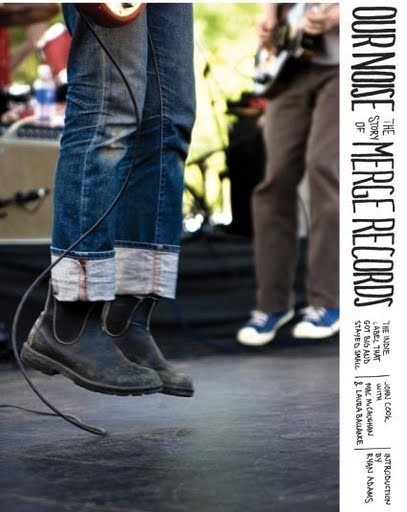“”Our Noise: The Story of Merge Records”” chronicles the 20-year history of the music label based in Chapel Hill, N.C. What began as a way for the band Superchunk to self-release its records slowly grew into one of the most respected and surprisingly successful independent labels in the U.S.
Author John Cook presents Merge’s story through extensive interviews with and profiles of cofounders Mac McCaughan and Laura Ballance, and some of the label’s more prominent bands and artists.
The book combines oral history with tour mementoes and photos, and serves as a cautionary tale for new and established bands considering a contract with a major label. Cook does a wonderful job recounting the circumstances that helped define Merge and its contemporaries, and contrasting their actions against such major record labels as Sire Records, Warner Bros. Records and EMI.
With the mainstream success of Nirvana and the rise of Seattle’s music scene, major labels trolled the independents in an effort to catch the next big band. Often, this resulted in bands that didn’t know what they were getting into with their contracts.
The label would give the band a large advance to produce a record, but then encouraged the band and its producers to waste it on re-recording sessions and lavish tours. After releasing the album and going on tour, the band would often end up owing the label more money than its advance. Rather than nurture a band and have it bring in steady sales, labels expected bands to create a hit with their first album.
Cook attributes Merge’s success to its frugality, but that can sometimes work against the label. Most labels would balk at the expense of making The Magnetic Fields’ 69 Love Songs, a three-disc set of songs featuring every music genre that covered the topic with a full-color, 76-page booklet.
Merge released it as a limited edition box set and as individual albums. It became a breakout record for Magnetic Fields and for Merge. Numerous publications and news organizations such as Rolling Stone, NPR and The New York Times covered the project, which led to the set and individual albums selling out and the label agonizing over how to capitalize on the unexpected success.
The book ends with McCaughan and Ballance talking about the label’s next step. At a time when people are predicting the death of the music industry amid falling CD sales, mp3s constituting an increasing portion of a music label’s sales and the prevalence of file sharing subverting mp3 sales, the history of Merge Records can serve as a model of how a music label can grow and succeed on its own terms.
Personal favorites from Merge Records
Neutral Milk Hotel: In the Aeroplane Over the Sea (1998) — It’s strange how lukewarm the critical reception was when this was first released. This album made it OK for a new generation of bands to explore their musical idiosyncrasies.
Camera Obscura: Biggest Bluest Hi-Fi (2001, re-released 2004), Underachievers Please Try Harder (2003), Let’s Get Out of This Country (2006) — The albums from this Scottish band capture some of the best aspects of pop music with bright, catchy melodies that underscore the often witty yet bittersweet lyrics. One of the best pop bands of the decade.
Destroyer: Your Blues (2004), Destroyer’s Rubies (2006) — Dan Bejar, the lone constant of Destroyer, described himself best in “”Priest’s Knees””: “”And I was just another West Coast maximalist exploring the blues.”” His clear-cut vocals stand in sharp contrast to the obscure and seemingly personal content of the lyrics.
Spoon: Girls Can Tell (2001) — Spoon’s breakout record offers a case study on the dangers of major music labels, especially when you consider another breakout record that year, The Strokes’ Is This It. Whereas The Strokes peaked on their second album and subsequently saw harsh reviews and little label support for their third (and possibly last) album, Spoon has been slowly and surely winning over critics and listeners with each release. Girls Can Tell also holds up better than Is This It.
Arcade Fire: Funeral (2004) — One of the juggernauts on the label with an electric live show to match its stature, Arcade Fire delivers a classic with Funeral, that all-too-rare album that has no filler and rewards with each listen.
The Clientele: Strange Geometry (2005), God Save The Clientele (2007) — This British band dresses its songs in lush harmonies and beautiful melodies. God Save ushers in a newfound sense of optimism into the mix and leaves a richer trail of melancholy and loneliness in its wake.









